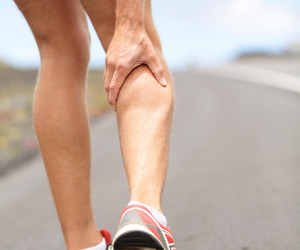
Such a condition refers to leg cramps or painful spasms that affect the muscles of the lower leg (calf muscles). It can occur anytime, but often in the middle of the night, jolting you awake with pain. They can also happen during physical fitness activities like cycling or running, but some people who have a sedentary lifestyle also experience this condition. Continue to find if you are closing to it and how to prevent.
What Causes Charlie Horse in Calf?
Although it is common, there are some common causes hidden behind the condition. Keep on reading to see if they occur on you.
- Dehydration. Not drinking enough water especially during intense physical activities or throughout the day is an important factor that can lead to Charlie horse in calf.
- Nutritional factors. You need a balance of minerals (like calcium, potassium, sodium, and magnesium) for proper muscle contraction and relaxation. However, it is important to obtain these from a balanced diet consisting of a variety of foods rather than from supplements alone.
- Issues during exercise. Insufficient warming up are one of those culprits. It is important to start work-up with warm-up exercises followed by stretches to keep your muscles supple and strong. Overexertion or Intense exercise can lead to muscle fatigue, which can cause Charlie horse in calf. Pacing yourself for heavy workouts is recommended. In addition, poorly fitting footwear or high-heeled shoes are a common cause of cramps.
- Poor circulation. Leg cramps that increase while walking can be a sign of poor blood circulation. Consult your doctor if the condition does not improve with rest.
- Medications. Certain medications including furosemide and statins, and certain medication types like drugs for high blood pressure, drugs for high cholesterol, drugs for chronic lung disease, etc. can cause leg muscle cramps. If you start experiencing Charlie horse in calf suddenly after taking new medications, consult your doctor timely.
- Other factors that can increase your likelihood of Charlie horse in calf include diabetes, alcoholism, Parkinson's disease, low blood sugar levels, hormonal problems like hypothyroidism, chemical imbalances, flat feet, etc.
Can It Be Serious?
Usually, Charlie horse in calf won't cause serious issue. However, you need to call your doctor if you experience severe pain, weakness with your muscle spasms, or muscle spasms that do not stop and spread to other parts of your body. Ask your doctor how you can improve your exercise program and reduce your risk of muscle spasms.
An occasional Charlie horse in calf does not require a medical diagnosis or specific treatment. However, if they become frequent or recurrent, your doctor may perform further examination to determine if you have poor circulation or nerve compression problems. Your doctor may also refer you to a physical therapist or another specialist for further evaluation and treatment.
How to Stop Charlie Horse in Calf
1. First-Aid Steps to Ease
- If they occur when you are lying down, try to stand up and put weight on the affected leg. This is sometimes enough to stop the cramps.
- Use heating pads to promote blood circulation to your muscle and relax it. You can also soak in a warm tub with Epsom salt to help ease muscle tension. Alternately, ice application helps relax muscle tension.
- For stubborn pain, try taking a non-steroidal anti-inflammatory medication, like ibuprofen.
2. Home Care Options
- Try to do some easy stretches to avoid Charlie horse in calf.After exercise, get a massage to relax your muscles with firm pressure for several seconds using your fist or thumb, and then knead the affected areagently.
- Additionally, you can use aromatherapy such as a scented candle, chamomile cream, or herbal tea as a natural muscle relaxant.
- If needed, you can also try physical therapy to prevent further complications such as nerve compression.
3. Medications
If you pain is severe or discomfort doesn't get improved, you can ask your doctor to prescribe medications and use only as directed. Yet, remember that medications may not always work for charlie horse in calf, and some side effects should be noticed.
How to Prevent Charlie Horse in Calf
1. Keep Nutrition Balance
Be sure to get plenty of magnesium, potassium, vitamin D3, and calcium. Get a blood test to monitor the iron levels, too. Nutritional deficiencies are often associated with leg cramps. Take enough of both food and supplements especially the following:
- Vitamin D—1,000 IU of daily. Best food sources include fortified soy milk, herring, salmon, and sardines.
- Calcium citrate—1,000 to 1,200 mg daily. Best food sources include dark leafy greens, canned salmon, sardines and almonds.
- Magnesium—400 to 500 mg. Best food sources include spinach, pumpkin seeds, and almonds.
- Try taking DHA omega-3 fatty acids (900 mg/day). This is not only good for your eyes and brain, but it can also help prevent Charlie horse in calf. You can also try taking omega-7 fatty acids (200 mg/day), another healthy fat with many benefits.
2. Do Some Stretch Before Sleeping
Stand a few inches away from a wall. Place your palms against the wall at the level of your shoulders and lean in until you feel a full stretch on your calf muscles. Hold the position for 30 seconds and relax. Then repeat. Also, sleeping with loose covers, especially if you are lying on your back helps a lot.
3. Lifestyle Tips
Drink plenty of water to avoid dehydration. Drink lots of water all throughout the day but don't overdo it towards the night. Eat bananas, which are rich in potassium and other nutrients that can help avoid leg cramps. Besides, exercise your legs and feet throughout the day by moving around. When doing some exercise, you'd better wear comfortable shoes to avoid occurrence.
